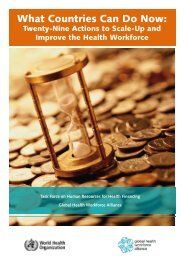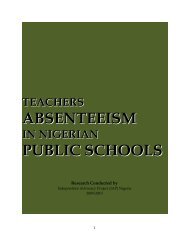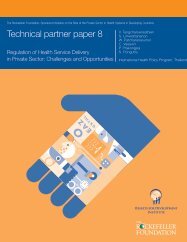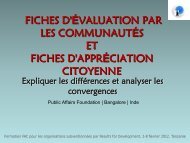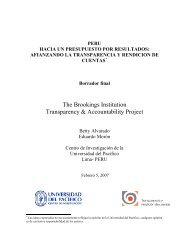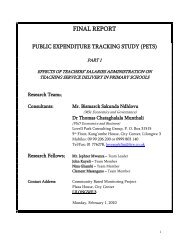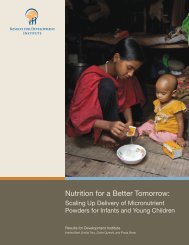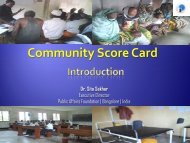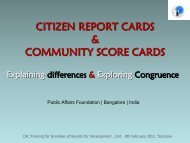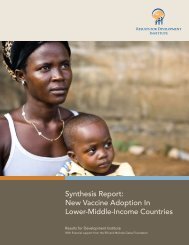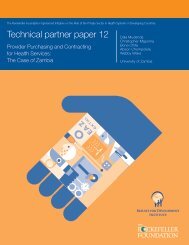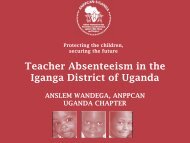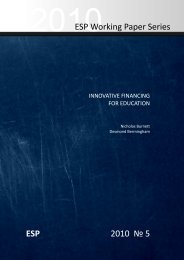Innovative Secondary Education For Skills Enhancement
Innovative Secondary Education For Skills Enhancement
Innovative Secondary Education For Skills Enhancement
You also want an ePaper? Increase the reach of your titles
YUMPU automatically turns print PDFs into web optimized ePapers that Google loves.
The program has three modules: company knowledge,<br />
general/social knowledge, and professional life. The<br />
professional life module includes debating and negotiating<br />
skills. Although there has been no formal assessment<br />
on its impact on students’ performance, it is a promising<br />
model that can expose students to ICT technology and<br />
more interactive learning. The major constraints include<br />
the cost of setting up the network and the lack of power<br />
supply and connectivity in rural areas.<br />
Giving Online Access to<br />
Learning (Cambodia)<br />
The Giving Online Access to Learning (GOAL) project—<br />
also developed at CIST—is an innovative distance learning<br />
project to help rural students in vocational training centers<br />
access content and courses that are not provided locally<br />
by teachers and also to help teachers in these rural training<br />
centers upgrade their skills. The distance learning course<br />
includes professional trainings, basic computer skills,<br />
business life, English language, and other subjects (i.e.,<br />
geography, physics, chemistry, and mathematics). GOAL<br />
is a joint project by CIST and an NGO called Connected<br />
School. Other NGOs such as Don Bosco are also involved<br />
in this project. GOAL also receives assistance and sponsorship<br />
from Smart Mobile, a telecom operator in Cambodia.<br />
Through GOAL, the skills trainings are delivered by two<br />
complementary methods: offline and online. With the offline<br />
method, teachers and students have access to different<br />
types of content and learning materials stored in a database<br />
located in Phnom Penh through the computer from<br />
their classroom. With the online method, a teacher located<br />
in Phnom Penh conducts an online classroom session<br />
equipped with a laptop, a microphone, and an interactive<br />
whiteboard. At the same time, the remote classrooms<br />
located outside Phnom Penh are equipped with a laptop,<br />
beamer, microphone, and speakers. The students in the<br />
rural schools can follow the lecture in real time as if they<br />
were in Phnom Penh—looking at the same whiteboard,<br />
listening to the same teacher, and asking questions. The<br />
fixed setup cost to equip a remote classroom is between<br />
US$1,500 and $3,000, depending on the need to provide<br />
electricity via a solar panel.<br />
<strong>Secondary</strong> Teacher Training<br />
Project in Science and<br />
Mathematics (Cambodia)<br />
To help address the lack of competent teachers in Cambodia’s<br />
education system, the <strong>Secondary</strong> Teacher Training<br />
Project in Science and Mathematics (STEPSAM)<br />
(2000–2004) was developed with assistance from the<br />
Japanese government to improve the quality of science<br />
classes through the enhancement of teachers’ skills and<br />
knowledge. STEPSAM was an attempt to change the<br />
learning style of students from passive to active by helping<br />
teachers develop practical activities, providing teaching<br />
materials, and enhancing teachers’ ability.<br />
The materials and equipment used were inexpensive and<br />
easily obtained from local markets. In addition, the topics<br />
were related to the curricula while the procedures were<br />
simple for less experienced teachers and students. Finally,<br />
the content was designed to encourage learners to become<br />
engaged in the scientific method. To counter the lack of<br />
teaching and learning materials, STEPSAM also developed<br />
a “Science Experiment Guide” for all upper secondary<br />
science teachers. The evaluation of the project indicated<br />
that the teaching materials and activities contributed to<br />
improve learners’ knowledge and provided teaching staff<br />
with activities and materials that were feasible in secondary<br />
classroom settings in many parts of Cambodia.<br />
Cooperative Teaching Methods<br />
for Science and Technology in<br />
<strong>Secondary</strong> Schools (Vietnam)<br />
Vietnam has made a concerted effort to accelerate innovation<br />
in the national curriculum and textbooks in all its<br />
secondary schools. Schools are also streamed into different<br />
categories, namely (i) basic, (ii) natural sciences, and<br />
(iii) social sciences and foreign languages. The curriculum<br />
is delivered through teaching methods that promote cooperative<br />
learning. ICT is also being gradually incorporated<br />
into the national curriculum. Research found that the<br />
achievement scores of classes with cooperative learning<br />
were found to be higher than those of non-experimental<br />
classes, with smaller dispersion.<br />
Curriculum Reform—Streaming Ict,<br />
Science, and Technology (Vietnam)<br />
The introduction of a streamed upper secondary curriculum<br />
constitutes one of the most important parts of the<br />
education reform in Vietnam. Since 2006–07, the upper<br />
secondary curriculum has been divided into three streams:<br />
(i) basic, (ii) natural sciences (and mathematics), and (iii)<br />
social sciences and foreign languages. The requirements<br />
for the three key streams are knowledge and skill standards<br />
(i.e., minimum and essential requirements) in all<br />
subjects in the curriculum. The natural sciences stream<br />
requires an advanced level for four subjects: mathematics,<br />
physics, chemistry, and biology. The social sciences and<br />
foreign languages stream requires an advanced level for<br />
four subjects: literature, history, geography, and foreign<br />
languages.<br />
<strong>Innovative</strong> Models for <strong>Skills</strong> <strong>Enhancement</strong> in Africa and Asia 55



